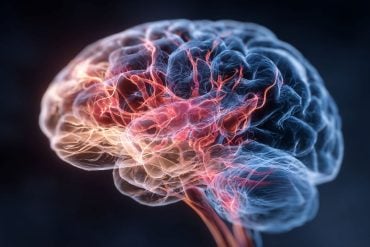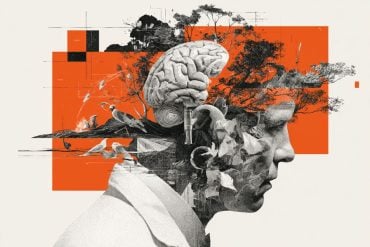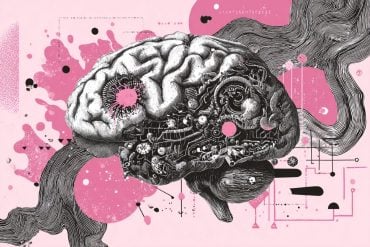Summary: Musical training may enhance the ability to process speech in noisy settings, a new study reveals.
Source: Chinese Academy of Sciences.
Musical training is associated with various cognitive improvements and pervasive plasticity in human brains. Among its merits, musical training is thought to enhance the cognitive and neurobiological foundation of speech processing, particularly in challenging listening environments, such as in a noisy restaurant. However, the brain mechanisms supporting any such potential advantages related to speech perception are not well specified.
A brain imaging study by Dr. DU Yi from the Institute of Psychology of the Chinese Academy of Sciences and her collaborator Dr. Zatorre Robert from the Montréal Neurological Institute and McGill University has revealed that musical training might improve speech perception in noisy environments via enhanced neural foundation in bottom-up auditory encoding, top-down speech motoric prediction, and cross-modal auditory-motor integration.
This study entitled “Musical training sharpens and bonds ears and tongue to hear speech better” has just been published online in PNAS and highlighted in the front session of the journal called “In This Issue”.
The study analyzed brain activity measured by functional magnetic resonance imaging (fMRI) of 15 musicians and 15 non-musicians, all on average 21-22 years of age, as they identified speech syllables against changing levels of background noise.
The musicians had started their musical education before age seven and accumulated at least 10 years of musical training. They had practiced consistently (?3 times per week) over the past three years. The two groups showed no difference in their hearing level, education, auditory working memory or non-verbal IQ.
While the two groups performed equally under a no-noise condition, the musicians outperformed non-musicians at all other signal-to-noise ratios (SNRs). This ability was associated with enhanced activation of the left inferior frontal and right auditory regions in the musicians’ brains.
Additional analysis revealed that neural patterns related to phonemes, which compose syllables, were more distinct in the bilateral auditory regions and speech production-related frontal motor regions of the musicians’ brains, as compared with non-musicians.

Moreover, musical training strengthened the functional connectivity of the auditory-motor network, which scaled with better behavioral performance.
The finding that musical training sharpens and bonds ears (the auditory system) and lips/tongue (the speech motor system) so that individuals can hear speech better is important.
It not only deepens our understandings of the neural mechanisms underlying musical training-related plasticity in processing speech, but also suggests great potential for musical training programs in alleviating speech perception difficulties commonly observed in aging populations and related to hearing disorders.
Funding: This research was supported by grants from the National Natural Science Foundation of China, the Thousand Young Talent Plan, and the Canadian Institutes of Health Research, as well as an infrastructure grant from the Canada Fund for Innovation.
Source: David Barnstone – Chinese Academy of Sciences
Publisher: Organized by NeuroscienceNews.com.
Image Source: NeuroscienceNews.com image is credited to DU Yi.
Original Research: Abstract for “Musical training sharpens and bonds ears and tongue to hear speech better” by Yi Du and Robert J. Zatorreb,d in PNAS. Published online December 4 2017 doi:10.1073/pnas.1712223114
[cbtabs][cbtab title=”MLA”]Chinese Academy of Sciences “Why Musical Training is Beneficial in Processing Speech.” NeuroscienceNews. NeuroscienceNews, 4 December 2017.
<https://neurosciencenews.com/music-speech-processing-8106/>.[/cbtab][cbtab title=”APA”]Chinese Academy of Sciences (2017, December 4). Why Musical Training is Beneficial in Processing Speech. NeuroscienceNews. Retrieved December 4, 2017 from https://neurosciencenews.com/music-speech-processing-8106/[/cbtab][cbtab title=”Chicago”]Chinese Academy of Sciences “Why Musical Training is Beneficial in Processing Speech.” https://neurosciencenews.com/music-speech-processing-8106/ (accessed December 4, 2017).[/cbtab][/cbtabs]
Abstract
Musical training sharpens and bonds ears and tongue to hear speech better
The idea that musical training improves speech perception in challenging listening environments is appealing and of clinical importance, yet the mechanisms of any such musician advantage are not well specified. Here, using functional magnetic resonance imaging (fMRI), we found that musicians outperformed nonmusicians in identifying syllables at varying signal-to-noise ratios (SNRs), which was associated with stronger activation of the left inferior frontal and right auditory regions in musicians compared with nonmusicians. Moreover, musicians showed greater specificity of phoneme representations in bilateral auditory and speech motor regions (e.g., premotor cortex) at higher SNRs and in the left speech motor regions at lower SNRs, as determined by multivoxel pattern analysis. Musical training also enhanced the intrahemispheric and interhemispheric functional connectivity between auditory and speech motor regions. Our findings suggest that improved speech in noise perception in musicians relies on stronger recruitment of, finer phonological representations in, and stronger functional connectivity between auditory and frontal speech motor cortices in both hemispheres, regions involved in bottom-up spectrotemporal analyses and top-down articulatory prediction and sensorimotor integration, respectively.
“Musical training sharpens and bonds ears and tongue to hear speech better” by Yi Du and Robert J. Zatorreb,d in PNAS. Published online December 4 2017 doi:10.1073/pnas.1712223114






